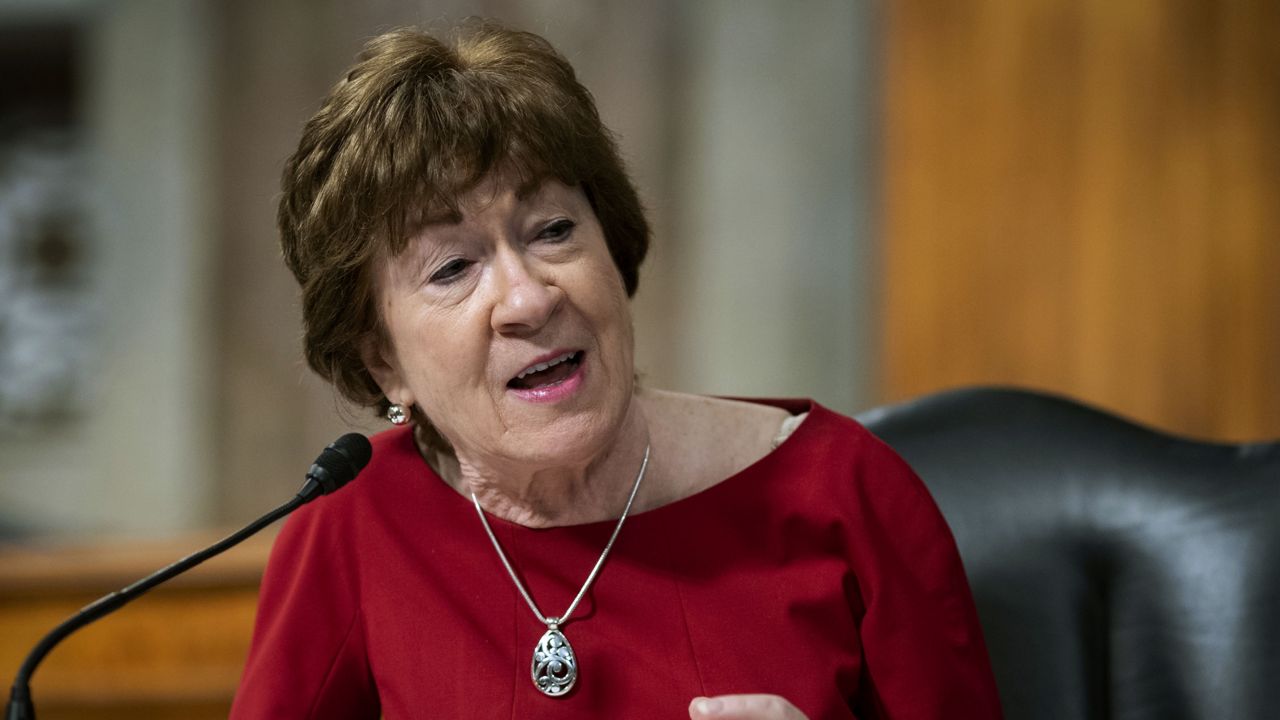WASHINGTON — A bipartisan group of lawmakers on Tuesday put forward a sweeping new stimulus package to address the COVID-19 pandemic, proposing $908 billion dollars in aid to help struggling Americans and their businesses.
Senators Joe Manchin (D-W.Va.), Susan Collins (R-Maine), Mark Warner (D-Va.), Bill Cassidy (R-La.), Jeanne Shaheen (D-N.H.), Lisa Murkowski (R-Alaska), Angus King (I-Maine), Mitt Romney (R-Utah) and Maggie Hassan (D-N.H.), as well as several members of the House of Representatives, delivered a press conference on Capitol Hill to introduce the legislation.
The stopgap bill is not a permanent solution to those struggling amid the pandemic, lawmakers said Tuesday. Instead, it’s a piecemeal proposal that aims to address the expiration of key programs that were funded under the last round of coronavirus relief.
The funding is broken down by “major issues” and allocated according to the cost estimate. For example, state, local, and tribal governments would receive $160 billion in funding under the plan; vaccine development programs would be allocated $16 billion, with support for small businesses — including the Paycheck Protection Program (PPP) — would receive $288 billion.
Notably, most Americans would not receive another direct payment under the proposed legislation.
In addition to providing funds, the bill aims to “provide short term Federal protection from Coronavirus related lawsuits with the purpose of giving states time to develop their own response,” per a copy of the legislation’s framework. Democrats had previously opposed this provision.
“We’ve worked night and day throughout the Thanksgiving recess because we recognize that families all across America are struggling, that businesses are closing, that hospitals are overwhelmed,” Sen. Collins said during a press conference introducing the legislation. “As we deal with this second wave, or third wave of the pandemic, it is absolutely essential that we pass emergency relief.”
Democratic senator Mark Warner of Virginia echoed his colleague’s statements, saying that while the proposal is “not going to make everybody happy,” it was an important temporary package to protect Americans.
“It would be stupidity on steroids if Congress left for Christmas without doing an interim package as a bridge. I think we've laid out that interim package, which shortly will appear,” Warner said.
“We have literally hundreds of thousands of small businesses across Virginia that are struggling, disproportionately we've seen those businesses that have been affected have been minority businesses,” Warner continued. “We've lost 440,000 black-owned businesses across america. literally destroying generations of wealth creation. In this package we have allocated $11 billion for investments in CDFIs, MDIs, and other institutions that will lend to these underserved communities. that will have a good short term and long term effect.”
It remains unclear whether Congress will approve of the legislation, which would provide aid from Dec. 1 through March 1, 2021. Congress has not passed a significant piece of COVID legislation since April, as House Speaker Nancy Pelosi and Senate Majority Leader Mitch McConnell have yet to agree on a deal.
But the group’s announcement did come just hours ahead of a scheduled meeting between Pelosi and Treasury Secretary Steve Mnuchin, where the two will likely discuss a potential COVID relief package.
“I will be speaking to the Speaker this afternoon, we’re going to talk about where we are on the appropriations issue. Keeping the government running, that is the first priority. And I’m sure we’ll also be mentioning COVID Relief,” Mnuchin told reporters on Capitol Hill Tuesday morning.
A temporary spending bill expires on Dec. 11, and Congress must act quickly to avoid a government shutdown.
Democrats have battled with Republicans and the White House for months over a fresh installment of COVID-19 relief that all sides say they want. But a lack of good faith and an unwillingness to embark on compromises that might lead either side out of their political comfort zones have helped keep another rescue package on ice.
The aid remains out of reach despite a fragile economy and out-of-control increases in coronavirus cases, especially in Midwest GOP strongholds.
McConnell has supplanted Mnuchin as the most important Republican force in the negotiations, but he hasn’t shown much openness for politically difficult compromises required for a COVID-19 deal that might anger conservatives. Neither have McConnell’s warnings of a wave of COVID-related lawsuits against businesses, schools and nonprofits open during the pandemic come to pass, undercutting his demand for blanket protections against such suits.
Pelosi seems to have overplayed her hand as she held out for $2 trillion-plus right up until the election. The results of the election, which saw Democrats lose seats in the House, appear to have significantly undercut her position, but she is holding firm on another round of aid to state and local governments.
The Associated Press contributed to this report.



